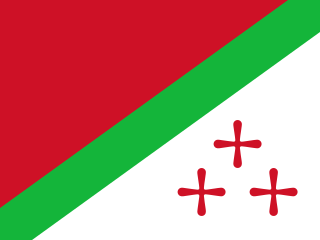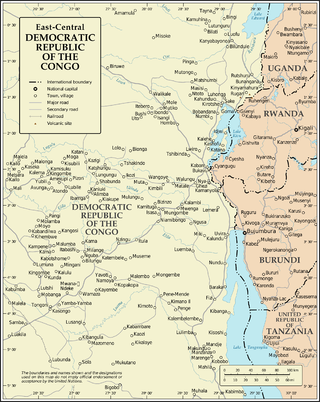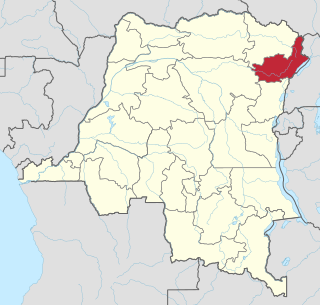
The United Nations Operation in the Congo was a United Nations peacekeeping force which was deployed in the Republic of the Congo in 1960 in response to the Congo Crisis. The ONUC was the UN's first peacekeeping mission with significant military capability, and remains one of the largest UN operations in size and scope.

The State of Katanga, also known as the Republic of Katanga, was a breakaway state that proclaimed its independence from Congo-Léopoldville on 11 July 1960 under Moïse Tshombe, leader of the local Confédération des associations tribales du Katanga (CONAKAT) political party. The new Katangese state did not enjoy full support throughout the province and was constantly plagued by ethnic strife in its northernmost region. It was dissolved in 1963 following an invasion by United Nations Operation in the Congo (ONUC) forces, and reintegrated with the rest of the country as Katanga Province.
United Nations Security Council Resolution 169, adopted on November 24, 1961, deprecated the secessionist activities in Katanga as well as armed action against United Nations forces and insisted that those activities cease. The council then authorized the Secretary-General to take whatever action necessary to immediately apprehend and deport all foreign military personnel, paramilitary personnel and mercenaries not with the UN and requested that the SG take all necessary measures to prevent their return. The Council then asked all member states to aid the Government of the Republic of the Congo and to prevent any actions which might contribute to the conflict there.

United Nations Security Council resolution 767, adopted unanimously on 24 July 1992, after reaffirming resolutions 733 (1992), 746 (1992) and 751 (1992), the Council noted the ongoing humanitarian efforts in Somalia by the United Nations and the deteriorating political situation in the country.

United Nations Security Council resolution 868, adopted unanimously on 29 September 1993, after expressing concern at the increasing number of attacks and use of force against persons engaged in United Nations peacekeeping operations, the council established new safety mandates for United Nations peacekeepers.

United Nations Security Council Resolution 1919, adopted unanimously on April 29, 2010, after recalling resolutions 1674 (2006), 1894 (2009) on the protection of civilians in armed conflict, 1612 (2005) and 1882 (2009) on children in armed conflict, 1502 (2003) on the protection of humanitarian and United Nations personnel, and 1325 (2000), 1820 (2008), 1888 (2009), and 1889 (2009) on women, peace, and security, the Council extended the mandate of the United Nations Mission in Sudan (UNMIS) until April 30, 2011 with the intention of renewing it further if necessary.

United Nations Security Council resolution 1273, adopted unanimously on 5 November 1999, after reaffirming resolutions 1234 (1999) and 1258 (1999) on situation in the Democratic Republic of the Congo, the Council extended the deployment of the 90 military liaison personnel as part of efforts to assist the peace process in the country until 15 January 2000.

United Nations Security Council resolution 1341, adopted unanimously on 22 February 2001, after recalling resolutions 1234 (1999), 1258 (1999), 1265 (1999), 1273 (1999), 1279 (1999), 1291 (2000), 1296 (2000), 1304 (2000), 1323 (2000) and 1332 (2000) on situation in the Democratic Republic of the Congo, the Council demanded that all parties to the conflict in the country implement disengagement plans and adopt withdrawal plans for foreign troops by 15 May 2001.

United Nations Security Council resolution 1393, adopted unanimously on 31 January 2002, after reaffirming all resolutions on Abkhazia and Georgia, particularly Resolution 1364 (2001), the Council extended the mandate of the United Nations Observer Mission in Georgia (UNOMIG) until 31 July 2002.

United Nations Security Council Resolution 1417 extended the mandate of the United Nations Organisation Mission in the Democratic Republic of Congo (MONUC) until 30 June 2003. It was unanimously adopted by the United Nations Security Council on 14 June 2002, at its 4,554th meeting. Resolution 1417 was passed after the security council recalled its previous resolutions regarding the matter, particularly Resolution 1355 (2001).

United Nations Security Council resolution 1468, adopted unanimously on 20 March 2003, after recalling previous resolutions on the situation in the Democratic Republic of the Congo, the Council welcomed an agreement on the establishment of a transitional government and requested an increased presence of the United Nations Mission in the Democratic Republic of Congo (MONUC) in the Ituri region in the east of the country amid escalating violence.

United Nations Security Council resolution 1493, adopted unanimously on 28 July 2003, after recalling all resolutions on the situation in the Democratic Republic of the Congo, the council extended the mandate of the United Nations Mission in the Democratic Republic of Congo (MONUC) until 30 July 2004 and raised its troop level from 8,700 to 10,800.

United Nations Security Council resolution 1522, adopted unanimously on 15 January 2004, after recalling all previous resolutions on the situation in the Democratic Republic of the Congo, the council welcomed efforts to establish the first integrated and unified brigade in Kisangani as a step towards forming a national army. It was the first Security Council resolution adopted in 2004.

United Nations Security Council resolution 1565, adopted unanimously on 1 October 2004 after recalling all previous resolutions on the situation in the Democratic Republic of the Congo, extended the mandate of the United Nations Mission in the Democratic Republic of Congo (MONUC) until 31 March 2005 and authorised an additional deployment of 5,900 troops and police. It reaffirmed the commitment to respect the “sovereignty, territorial integrity and political independence [sic]” of Congo and States in the region.

United Nations Security Council Resolution 1592, adopted unanimously on 30 March 2005, after recalling all previous resolutions on the situation in the Democratic Republic of the Congo, including Resolution 1565 (2004), the Council extended the mandate of the United Nations Mission in the Democratic Republic of Congo (MONUC) until 1 October 2005.

United Nations Security Council Resolution 1649, adopted unanimously on 21 December 2005, after recalling all previous resolutions on the situation in the Democratic Republic of the Congo, including resolutions 1533 (2004), 1565 (2004), 1592 (2005), 1596 (2005) and 1616 (2005), 1621 (2005) and 1628 (2005), the council extended and expanded sanctions against the country until 31 July 2006, and demanded that foreign fighters disarm or face sanctions.
United Nations Security Council Resolution 1671, adopted unanimously on April 25, 2006, after recalling previous resolutions concerning the situation in the Democratic Republic of the Congo, particularly resolutions 1565 (2004), 1592 (2005), 1621 (2005) and 1635 (2005), the Council authorised the deployment of the European Union's EUFOR RD Congo force to assist the United Nations Mission in the Democratic Republic of the Congo (MONUC) during the 2006 general elections.

United Nations Security Council Resolution 1698, adopted unanimously on July 31, 2006, after recalling all previous resolutions concerning the situation in the Democratic Republic of the Congo, including resolutions 1493 (2003), 1533 (2004), 1552 (2004), 1565 (2004), 1592 (2005), 1596 (2005), 1616 (2005), 1649 (2005) and 1654 (2006), the Council renewed sanctions against the country until July 31, 2007.
Operation Rum Punch or Operation Rampunch was a military action undertaken by United Nations peacekeeping forces on 28 August 1961 against the military of the State of Katanga, a secessionist state from the Republic of the Congo in central Africa. UN troops arrested 79 foreign mercenaries and officers employed by Katanga with little conflict.
The Battle of Kabalo was fought at Kabalo by United Nations peacekeeping forces and Baluba militias from 7 April to 11 April 1961 against mercenaries and the gendarmerie of the State of Katanga, a secessionist state rebelling against the Republic of the Congo in central Africa. The Katangese forces attacked the town as part of a larger offensive meant to restore their authority in northern Katanga which was challenged by the Baluba. A United Nations Operation in the Congo peacekeeping contingent garrisoning Kabalo, acting under the authority of their mandate to prevent civil war in the country, resisted the initial attack and arrested 30 mercenaries in Katanga's employ. Armed Baluba repelled a Katangese ferry carrying troops as well as an armoured train. The next day the ferry returned but was sunk by UN forces. Fighting continued over the next few days between the Baluba and Katangese until the latter withdrew. The battle led to a deterioration of relations between the Katangese government and the United Nations Operation in the Congo.
















